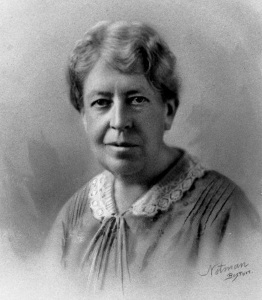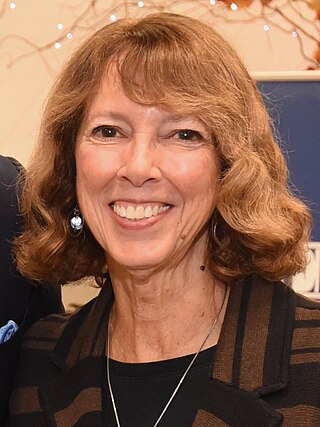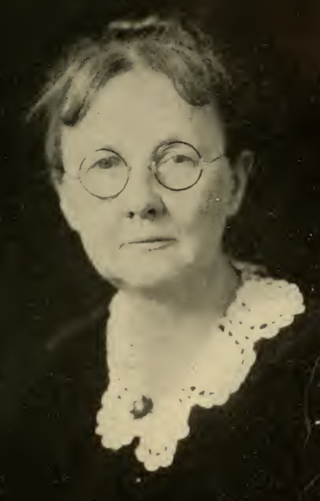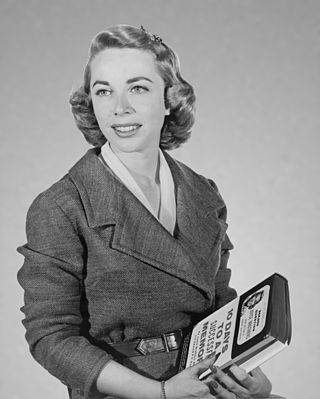Related Research Articles
The Seven Sisters are a group of seven liberal arts colleges in the Northeastern United States that are historically women's colleges. Barnard College, Bryn Mawr College, Mount Holyoke College, Smith College, and Wellesley College are still women's colleges. Vassar College became coeducational in 1969, and Radcliffe College was absorbed in 1999 by Harvard College and now offers programs in advanced study.

Mary Whiton Calkins was an American philosopher and psychologist, whose work informed theory and research of memory, dreams and the self. In 1903, Calkins was the twelfth in a listing of fifty psychologists with the most merit, chosen by her peers. Calkins was refused a Ph.D. by Harvard University because of her gender.

Mildred Helen McAfee Horton was an American academic, educator, naval officer, and religious leader. She served during World War II as first director of the WAVES in the United States Navy. She was the first woman commissioned in the U.S. Navy Reserve and the first woman to receive the Navy Distinguished Service Medal.

Wendy Liebman is an American stand-up comedian. Her standup style involves the use of gently paced, subtle wordplay.
Martha Kent McClintock is an American psychologist best known for her research on human pheromones and her theory of menstrual synchrony.

Janet Morgan Riggs is an American psychologist and academic administrator. She served as the 14th President of Gettysburg College from 2009 to 2019. Riggs, a member of the Gettysburg College class of 1977, has held several positions at the college, including professor of psychology, interim provost, provost, executive assistant to the president, and interim president.
Relational-cultural theory, and by extension, relational-cultural therapy (RCT) stems from the work of Jean Baker Miller, M.D. Often, relational-cultural theory is aligned with the feminist and or multicultural movements in psychology. In fact, RCT embraces many social justice aspects from these movements.

Ethel Dench Puffer Howes was an American psychologist, suffragist, and college professor. She taught at Wellesley College, Smith College, and Simmons College. She was Executive Secretary of the National College Equal Suffrage League, and founder of the Institute for the Coordination of Women's Interests at Smith College.
Judith V. Jordan is the co-director and a founding scholar of the Jean Baker Miller Institute and co-director of the institute's Working Connections Project. She is an attending psychologist at McLean Hospital and assistant professor of psychology at the Harvard Medical School. She works as a psychotherapist, supervisor, teacher and consultant. Jordan's development of relational-cultural therapy has served as a foundation for other scholars who have used this theory to explore the workplace, education. leadership and entrepreneurship.
Jean Baker Miller (1927–2006) was a psychiatrist, psychoanalyst, social activist, feminist, and author. She wrote Toward a New Psychology of Women, which brings psychological thought together with relational-cultural theory.
Janet Allison Taylor Spence was an American psychologist who worked in the field of the psychology of anxiety and in gender studies.

Eleanor Acheson McCulloch Gamble was an influential American psychologist from the late 19th century through the early 20th century. Gamble published most of her work on audition and memory influenced by Georg Elias Müller, Edward B. Titchener, Mary Whiton Calkins, and Ernst Heinrich Weber. Despite her chronic eye conditions she was successful in editing volumes of textbooks, her own papers, and directing many master's degree students. She earned her undergraduate degree from Wellesley College in 1889. She went on to obtain her doctorate from Cornell University in 1898. She held several teaching positions over the course of her career and was a member of several influential organizations including the American Psychological Association (APA). Gamble was a distinguished and well-liked professor at Wellesley College for more than two decades, and by 1930 she was the head of the Department of Philosophy and Psychology following the death of Mary Whiton Calkins. At the time of her death she was professor of psychology and director of the psychological laboratory at Wellesley College.

Florence Harriet Levin Denmark is an American psychologist and a past president of the American Psychological Association (APA) (1980-1981). She is a pioneering female psychologist who has influenced the psychological sciences through her scholarly and academic accomplishments in both psychology and feminist movements. She has contributed to psychology in several ways, specifically in the field of psychology of women and human rights, both nationally and internationally.
Dorothy Christina Adkins was an American psychologist. Adkins is best known for her work in psychometrics and education testing, particularly in achievement testing. She was the first female president of the Psychometric Society and served in several roles in the American Psychological Association.
Paula Adina Johnson is an American cardiologist and the current president of Wellesley College. She is the first Black woman to serve in this role. The first Black graduate of Wellesley College came in the year 1887, and 129 years later President Johnson became the first Black leader. Prior to her role as president of Wellesley, Johnson founded and served as the inaugural executive director of the Mary Horrigan Connors Center for Women's Health & Gender Biology, as well as Chief of the Division of Women's Health at Brigham and Women's Hospital. Johnson was the Grace A. Young Family Professor of Medicine in the field of women's health, an endowed professorship named in honor of her mother, at Harvard Medical School. She was also Professor of Epidemiology at the Harvard T.H. Chan School of Public Health. She is a member of the National Academy of Medicine and has been featured as a national leader in medicine by the National Library of Medicine.

Joyce Diane Brothers was an American psychologist, television personality, advice columnist, and writer.
Martha Tamara Shuch Mednick was a feminist psychologist known for her work on women, gender, race and social class. She was a professor of psychology at Howard University from 1968 until her retirement in 1995.

Thelma Hunt was an American expert in psychological testing. Chair of the George Washington University Psychology Department for twenty-five years, she was an innovator in test construction and measurement for what is now known as industrial and organizational psychology. Hunt and her frequent collaborator Fred A. Moss developed several tests still in use, including the first version of the Medical College Admission Test (MCAT).
Eugenia Hanfmann was an American psychologist and educator who was born in Russia. Early in her career, Hanfmann was associated with Kurt Koffka and the Gestalt movement of psychology. Later she conducted research and published on schizophrenia and personality assessment. Hanfmann established a counseling service at Brandeis University and helped form its psychology department with Abraham Maslow. Hanfmann is considered to be one of the early pioneers of women in psychology.
References
- 1 2 Alper, Thelma G. "United States Social Security Death Index". FamilySearch. Retrieved 30 December 2014.
- 1 2 Ogilvie, Marilyn; Harvey, Joy, eds. (2000). The Biographical Dictionary of Women in Science . New York: Routledge. pp. 26–27. ISBN 0415920388.
- 1 2 3 "Psychology in the United States | Jewish Women's Archive". jwa.org. Retrieved 2017-12-02.
- 1 2 3 4 5 6 7 8 9 10 11 12 13 14 15 16 17 18 19 20 21 22 23 24 25 26 27 28 29 30 31 32 33 34 35 36 37 38 39 40 41 42 43 44 45 46 47 48 49 50 51 52 53 54 55 56 57 Models of achievement : reflections of eminent women in psychology. O'Connell, Agnes N., Russo, Nancy Felipe, 1943-. Columbia University Press. 1983. ISBN 0231053126.
{{cite book}}: CS1 maint: others (link) - 1 2 3 Gul, Pelin. "Thelma G. Alper - Psychology's Feminist Voices". www.feministvoices.com. Archived from the original on 2017-12-03. Retrieved 2017-12-02.
- ↑ "MPA Awards - Massachusetts Psychological Association, Inc". www.masspsych.org. Retrieved 2017-12-02.